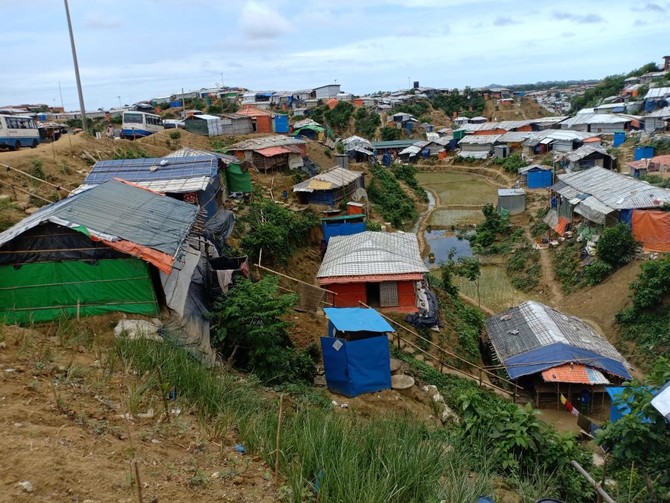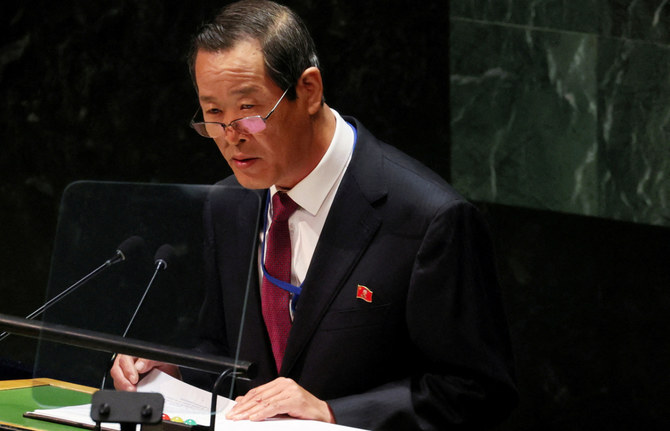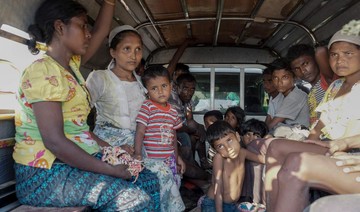DHAKA: Rohingya refugees have told Arab News they fear going back to Myanmar after a government minister made derogatory remarks about Islam.
Myanmar’s Minister for Religious Affairs and Culture Thura Aung Ko also made comments about the Muslim minority group, which has been subjected to a military crackdown described by the United Nations as a textbook example of ethnic cleansing.
Ko alleged that Rohingya youths in refugee camps across the border in Bangladesh were being brainwashed to “truly march toward Myanmar” and referred to the Rohingya as Bengalis, a term used by Naypyidaw to paint the group as illegal immigrants.
In another video, released by Radio Free Asia, Ko alleged that Myanmar’s Buddhist population was under threat.
“While we Buddhists practice monogamy and have only one or two children, an extreme religion encourages having three or four wives and giving birth to 15 to 20 children. After three, four, five decades in this Buddhist country, the Buddhist community will certainly become the minority,” he said in the video.
The Rohingya have faced severe discrimination in Myanmar and been the target of violence for years, notably in 2017.
Thousands were killed and more than 720,000 fled their homes following a Myanmar military crackdown purportedly aimed at militants, according to rights group.
Myanmar refuses to recognize the Rohingya as a legitimate native ethnic minority and they are denied citizenship and other rights.
“We were living in a highly hostile environment, in many cases that were backed by the state. Now the world witnessed it once again after the religious affairs minister’s comments,” Daud Ali told Arab News, a 47-year-old living in the Kutapalang refugee camp in the southeastern city of Cox’s Bazar.
Another refugee at the same camp, 27-year-old Sayed Alam, said the Rohingya had always been treated as second class citizens.
“Our movements were highly restricted even in Rakhine,” he told Arab News, referring to the western Myanmar state where the majority of the Rohingya live, “so it’s no wonder that a minister of (Aung) Suu Kyi’s government makes derogatory remarks about Muslims.”
Bangladesh protested Ko’s remarks, summoning Myanmar’s Ambassador Lwin Oo to the Foreign Ministry in Dhaka on Wednesday.
Delwar Hossain, from the Foreign Ministry, said Bangladesh had conveyed its displeasure.
“We consider that these types of comments are unacceptable and disgraceful. Bangladesh has strongly objected and made its position clear. In the entire conversation, Myanmar’s envoy did not utter any words in defense of his country and only assured to convey Dhaka’s message to Naypyidaw,” Hossain told Arab News.
Ko, a former Myanmar army general, was appointed in 2016 by Suu Kyi after her party came to power in a general election landslide victory.
“Myanmar does not seem interested in Rohingya [refugees] repatriation,” former Bangladesh Ambassador to the United States Humayun Kabir told Arab News.
Myanmar would not be making negative remarks about Bangladesh if it were genuinely interested in creating a conducive environment for repatriation, he added.
“Actually Bangladesh has no other option to move forward with the repatriation issue except for creating more diplomatic pressure from the international community.”
An attempt to repatriate Rohingya refugees last month failed because of their refusal to go of their own accord.
They had a list of demands before any repatriation including safety and security in Rakhine, citizenship guarantee and freedom of movement.
The UNHCR is helping Bangladesh with the repatriation process to ensure it is voluntary.
One official report from humanitarian agencies said more than 15,000 Rohingyas had entered Bangladesh since January 2018.
“It is very clear that Myanmar’s government is not willing to repatriate us and that’s why they are constantly spreading negative comments about Rohingyas,” said Mohammad Ashraf, a 38-year refugee from Balukhali camp. “How can we return to Myanmar amid such an unpleasant situation and hatred?”
Rohingya refugees wary after Myanmar minister’s hostile remarks
Rohingya refugees wary after Myanmar minister’s hostile remarks

- Myanmar ambassador summoned by Dhaka
- Crackdown on Rohingya was ‘ethnic cleansing’ said UN
Driver dies after crashing into White House perimeter gate, Secret Service says

- The driver was not immediately identified
WASHINGTON: A driver died after crashing a vehicle into a gate at the White House Saturday night, authorities said.
The driver was found dead in the vehicle following the crash shortly before 10:30 p.m. at an outer perimeter gate of the White House complex, the US Secret Service said in a statement.
Security protocols were implemented but there was no threat to the White House, the agency said.
The driver was not immediately identified.
The Secret Service will continue to investigate the matter, while turning over the fatal crash portion of the investigation to the Washington Metropolitan Police Department, the agency said.
Fake videos of Modi aides trigger political showdown in India election

- Indian police arrest nine people for circulating fake video of Indian Home Minister Amit Shah
- With more than 800 million Internet users, tackling misinformation in India is a huge challenge
BENGALURU/LUCKNOW: Manipulated videos are taking center stage as campaigning heats up in India’s election, with fake clips involving two top aides of Prime Minister Narendra Modi triggering police investigations and the arrest of some workers of his rival Congress party.
In what has been dubbed as India’s first AI election, Modi said last week fake voices were being used to purportedly show leaders making “statements that we have never even thought of,” calling it a conspiracy “to create tension in society.”
Indian police — already investigating the spread of fake videos showing Bollywood actors criticizing Modi — are now investigating a doctored online clip that showed federal home minister Amit Shah saying the ruling Bharatiya Janata Party will stop certain social guarantees for minorities, a subject sensitive for millions of voters.
Shah retorted on X, posting his “original” and the edited “fake” speech and alleging — without providing any evidence — that the main opposition Congress was behind the video it created to mislead the public. The minister said “directions have been issued to the police to address this issue.”
Indian police arrested at least nine people, including six members of Congress’ social media teams, in the states of Assam, Gujarat, Telangana and New Delhi last week for circulating the fake video, according to police statements.
Five of the Congress workers were released on bail, but the most high-profile arrest made by the cybercrime unit of New Delhi police came on Friday, when they detained a Congress national social media coordinator, Arun Reddy, for sharing the video. New Delhi is one region where Shah’s ministry directly controls police. Reddy has been sent into three-day custody.
The arrest has sparked protests from Congress workers with many posting on X using the #ReleaseArunReddy tag. Congress lawmaker Manickam Tagore said the arrest was an example of “authoritarian misuse of power by the regime.”
Congress’ head of social media, Supriya Shrinate, did not respond to messages and an email seeking comment.
MISINFORMATION
India’s election from April 19 to June 1 will be the world’s largest democratic event. With nearly a billion voters and more than 800 million Internet users, tackling the spread of misinformation is a high stakes job. It involves round-the-clock monitoring by police and election officials who often issue take down orders to Facebook and X as investigations start.
In India’s most populous state of Uttar Pradesh, more than 500 people keep tabs on online content, flagging controversial posts and coordinating with social media companies for their removal when needed, police chief Prashant Kumar told Reuters on Saturday.
Another fake video that sparked a storm last week showed Yogi Adityanath, the state’s chief minister, criticizing Modi for not doing enough for families of those who died in a 2019 militant attack. Though fact checkers said the video was created using different parts of an original clip, state police called it an “AI generated, deepfake.”
Using Internet address tracking, state police arrested a man named Shyam Gupta on May 2 who had shared the fake video post on X a day earlier, receiving over 3,000 views and 11 likes.
The police have accused Gupta of forgery and promoting enmity under Indian law provisions that can carry a jail term of up to seven years if convicted. Reuters could not reach him as he is currently serving a 14-day custody period.
“This person is not a tech guy. Had he been tech savvy, arresting him quickly would not have been possible,” said police officer Kumar.
Australian police shoot boy dead after stabbing with ‘hallmarks’ of terrorism

SYDNEY,: Australian police said on Sunday they had shot dead a boy after he stabbed a man in Western Australia’s capital Perth, in an attack authorities said indicated terrorism.
There were signs the 16-year-old, armed with a kitchen knife, had been radicalized online, state authorities said, adding they received calls from concerned members of the local Muslim community before the attack, which occurred late on Saturday night.
The attack, in the suburb of Willetton, had “hallmarks” of terrorism but was yet to be declared a terrorist act, police said.
“At this stage it appears that he acted solely and alone,” Western Australia Premier Roger Cook told a televised press conference in the state capital Perth, regarding the attacker.
The victim, stabbed in the back, was stable in hospital, authorities said.
Prime Minister Anthony Albanese said he had been briefed on the incident by police and intelligence agencies, which advised there was no ongoing threat.
“We are a peace-loving nation and there is no place for violent extremism in Australia,” Albanese said on social media platform X.
The incident comes after New South Wales police last month charged several boys with terrorism-related offenses in investigations following the stabbing of an Assyrian Christian bishop while he was giving a live-streamed sermon in Sydney, on April 15.
The attack on the bishop came only days after a stabbing spree killed six in the Sydney beachside suburb of Bondi.
Gun and knife crime is rare in Australia, which consistently ranks among the safest countries in the world, according to the federal government. (Reporting by Sam McKeith in Sydney; Editing by Christian Schmollinger and William Mallard)
North Korea’s UN ambassador says new sanctions monitoring groups will fail

- Earlier this year, Russia vetoed the annual renewal of a panel of experts amid US-led accusations that North Korea has transferred weapons to Russia for use in its war in Ukraine
SEOUL: Efforts led by the US and other Western countries to form new groups to monitor sanctions on North Korea will fail, the country’s UN envoy said on Sunday, according to state media KCNA.
Ambassador Kim Song made the comment in response to a joint statement the US and its allies issued this week calling to continue the work of a UN panel of experts monitoring longstanding sanctions against Pyongyang for its nuclear weapons and missile programs.
Earlier this year, Russia vetoed the annual renewal of the panel amid US-led accusations that North Korea has transferred weapons to Russia for use in its war in Ukraine.
“The hostile forces may set up the second and third expert panels in the future but they are all bound to meet self-destruction with the passage of time,” KCNA quotes Kim as saying in a statement.
Last month, US Ambassador to the United Nations Linda Thomas-Greenfield visited the Demilitarized Zone, a heavily fortified border between the two Koreas, which remain technically at war and urged Russia and China to stop rewarding North Korea for its bad behavior.
Her trip came after Russia rejected the annual renewal of the multinational panel of experts that has over the past 15 years monitored the implementation of UN sanctions aimed at curbing North Korea’s nuclear and missile programs.
China publicizes for the first time what it claims is a 2016 agreement with Philippines

- The move threatens to further raise tensions in the disputed waterway, through which much of the world’s trade passes and which China claims virtually in its entirety
TAIPEI, Taiwan: For the first time, China has publicized what it claims is an unwritten 2016 agreement with the Philippines over access to South China Sea islands.
The move threatens to further raise tensions in the disputed waterway, through which much of the world’s trade passes and which China claims virtually in its entirety.
A statement from the Chinese Embassy in Manila said the “temporary special arrangement” agreed to during a visit to Beijing by former president Rodrigo Duterte allowed small scale fishing around the islands but restricted access by military, coast guard and other official planes and ships to the 12 nautical mile (22 kilometer) limit of territorial waters.
The Philippines respected the agreement over the past seven years but has since reneged on it to “fulfill its own political agenda,” forcing China to take action, the statement said.
“This is the basic reason for the ceaseless disputes at sea between China and the Philippines over the past year and more,” said the statement posted to the embassy’s website Thursday, referring to the actions of the Philippines.
President Ferdinand Marcos Jr. and Duterte have denied forging any agreements that would have supposedly surrendered Philippine sovereignty or sovereign rights to China. Any such action, if proven, would be an impeachable offense under the country’s 1987 Constitution.
However, after his visit to Beijing, Duterte hinted at such an agreement without offering details, said Collin Koh, senior fellow at the S. Rajaratnam School of International Studies based in Nanyang Technological University, Singapore and an expert on naval affairs in the Indo-Pacific region, particularly Southeast Asia.

“He boasted then that he not only got Chinese investment and trade pledges, but also that he secured Philippine fishermen access to Scarborough Shoal,” Koh said, referring to one of the maritime features in dispute.
Beijing’s deliberate wording in the statement “is noteworthy in showing that Beijing has no official document to prove its case and thus could only rely mainly on Duterte’s verbal claim,” Koh said.
Marcos, who took office in June 2022, told reporters last month that China has insisted that there was such a secret agreement but said he was not aware of any.
“The Chinese are insisting that there is a secret agreement and, perhaps, there is, and, I said I didn’t, I don’t know anything about the secret agreement,” said Marcos, who has drawn the Philippines closer to its treaty partner the US “Should there be such a secret agreement, I am now rescinding it.”
Duterte nurtured cozy relations with Chinese President Xi Jinping during his six-year presidency while openly being hostile to the United States for its strong criticism of his deadly campaign against illegal drugs.
While he took an almost virulently anti-American stance during his 2016 visit to Washington’s chief rival, he has said he also did not enter into any agreement with Beijing that would have compromised Philippine territory. He acknowledged, however, that he and Xi agreed to maintain “the status quo” in the disputed waters to avoid war.
“Aside from the fact of having a handshake with President Xi Jinping, the only thing I remember was that status quo, that’s the word. There would be no contact, no movement, no armed patrols there, as is where is, so there won’t be any confrontation,” Duterte said.
Asked if he agreed that the Philippines would not bring construction materials to strengthen a Philippine military ship outpost at the Second Thomas Shoal, Duterte said that was part of maintaining the status quo but added there was no written agreement.
“That’s what I remember. If it were a gentleman’s agreement, it would always have been an agreement to keep the peace in the South China Sea,” Duterte said.
House Speaker Ferdinand Martin Romualdez, Marcos’s cousin and political ally, has ordered an investigation into what some are calling a “gentleman’s agreement.”
China has also claimed that Philippine officials have promised to tow away the navy ship that was deliberately grounded in the shallows of the Second Thomas Shoal in 1999 to serve as Manila’s territorial outpost. Philippine officials under Marcos say they were not aware of any such agreement and would not remove the now dilapidated and rust-encrusted warship manned by a small contingent of Filipino sailors and marines.
China has long accused Manila of “violating its commitments” and “acting illegally” in the South China Sea, without being explicit.
Apart from China and the Philippines, Vietnam, Malaysia, Taiwan and Brunei also have overlapping claims in the sea that is rich in fishing stocks, gas and oil. Beijing has refused to recognize a 2016 international arbitration ruling by a UN-affiliated court in the Hauge that invalidated its expansive claims on historical grounds.
Skirmishes between Beijing and Manila have flared since last year, with massive Chinese coast guard cutters firing high-pressure water cannons at Philippine patrol vessels, most recently off Scarborough Shoal late last month, damaging both. They have also accused each other of dangerous maneuvering, leading to minor scrapes.
The US lays no claims to the South China Sea, but has deployed Navy ships and fighter jets in what it calls freedom of navigation operations that have challenged China’s claims.
The US has warned repeatedly that it’s obligated to defend the Philippines — its oldest treaty ally in Asia — if Filipino forces, ships or aircraft come under an armed attack, including in the South China Sea.





















